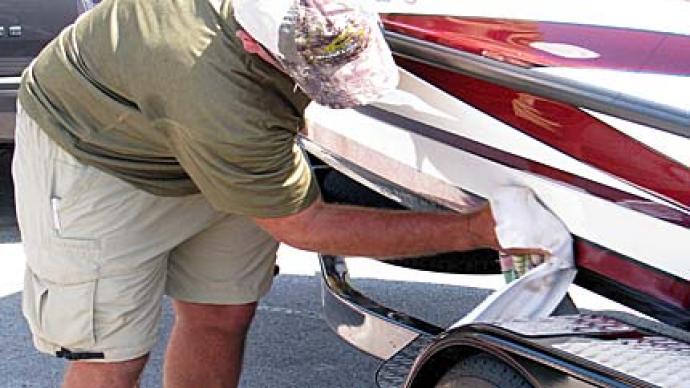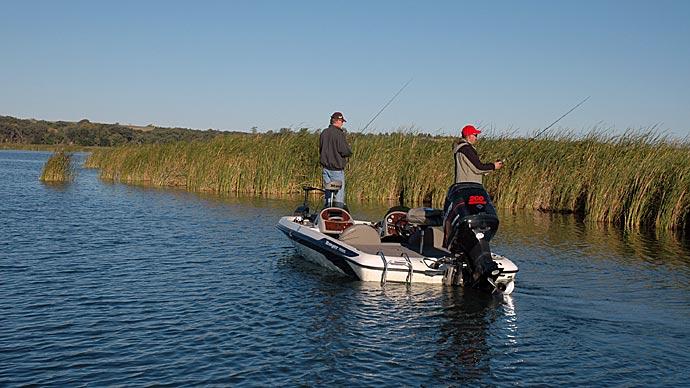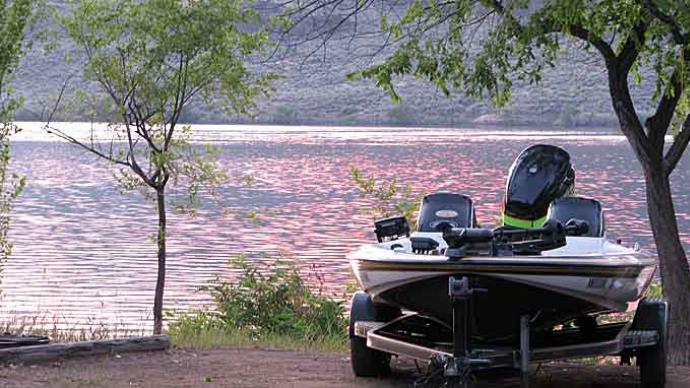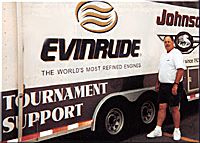
You ease out past the start boat. Slowly, you push the throttle full out. Your Ranger bass boat rises and scoots across the lake. The tournament has begun, and the clock is ticking. Then putt, putt, putt, putt. Your outboard motor quits running, and the boat settles down in the water.
Frantically, you try to restart the motor. But it won't turn over. All you can do is drop the trolling motor and limp back to the ramp. The tournament gremlins have struck.
Now, who are you going to call?
If it's Dan Anderson, director of the OMC tournament field service team, he will immediately head for the dock. And after a few adjustments and possibly a few ribbing remarks, your outboard will be up and running to take you to your fishing spot.
While on-the-water motor problems are rare, OMC doesn't take chances. As part of its commitment to Operation Bass tournament programs, the company maintains two field service crews to handle tournament boat repairs. One crew, headed by Rick Luttrell, covers tournaments west of the Mississippi River. Anderson leads the East service crew and the Wal-Mart FLW Tour.
"We're roadies," Anderson says. "We're the pit crew of the pros if you look at it in NASCAR terms. We have full-service capabilities, and there are not too many things we can't handle."
Anderson has been following the Wal-Mart FLW Tour since it began. He likewise visits the EverStart tournaments and some Red Man events. At each tournament, Anderson sets up a unique service center to repair and maintain Johnson and Evinrude outboard motors. His job is to keep things running.
"There are people almost every day that ask me what I do for a living," he says. "When I tell them, most people look at my job and say I have the world by the tail. But it's hard work, and I work hard at it."
Anderson has a long history of hard work and working with outboard motors, even before his 23-year career with OMC. At a very young age, Anderson found out he was mechanically inclined. Throughout his adolescence, he repaired neighborhood lawnmowers in his hometown of Greenwood, Miss.
The word about his skill with a wrench spread quickly, and when he turned 15, he started working for a local marina, Ralph. Kimball's Sporting Goods, fixing outboard motors and boats.
"That's kind of what got me started," he says. "I always had aspirations to work for a manufacturer."
But Anderson knew he needed the education to fulfill his career plans. After high school, he headed to the University of Mississippi, and in 1976 he graduated with a business degree. While learning about marketing and economics in college, Anderson never strayed far from outboards. Most of his semester breaks were spent working for Barnett's Outboards, a small marina near his Hattiesburg, Miss., home.
Most college advisors recommend graduates send out dozens of resumés. Competition for a job is usually excellent, and the more resumés one sends, the better the chances of landing a job. That wasn't how Anderson played the job hunt game. "After I left college, I sent out only one resumé," he recalls. "I just called on Johnson [Outboards]."
To Anderson's surprise and delight, he, at 22, landed a field service manager's position with the outboard motor company in September 1976. He became the youngest field service manager on the road. For the next 18 years, Anderson visited marinas and boat yards throughout the south, offering technical support.
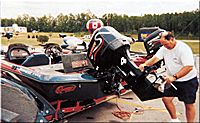
"In 1994, they called and asked me if I'd like to be the field service manager for special events," he says. Anderson jumped at the opportunity, but life on the road is not easy. He and his crew travel to dozens of tournaments from Maine to Florida - sometimes hitting two or more in the same week. These travels keep him away from his Smyrna, Tenn., home for about 200 nights each year. But through it all, he has maintained a 25-year marriage with his wife, Karen. Together the couple raised two children, Chad, 22, and April, 20.
At each tournament, Anderson oversees the setup of the OMC mobile service station. The station has about $25,000 in stock parts and has full service and repair capabilities. This servicing sometimes means sleepless nights for Anderson and his crew.
Tournament anglers need their boats operating. A breakdown means the angler loses a day on the water. Anderson makes sure that doesn't happen. After the daily weigh-in, the 6-foot, 3-inch, 300-pound giant goes to work repairing outboard and electric motors.
There are no afternoon naps either. While the anglers are out on the water, he prepares the Wal-Mart FLW Tour boats for their run on the lake. Anderson says that the FLW boats are kept in peak condition between the OMC and Ranger service crews when they take the television spotlight during the final competition days.
Anderson also has the unique opportunity to work with all the top anglers. "I can't think of a sport, maybe except football, that takes the physical abuse that the anglers go through. I have a lot of respect for the pro anglers. It's hard work, and I wouldn't do it for all the tea in China," he says. "We follow them week in and week out. And at some point in time, I'll get to work with them."
Throughout his five-year career on the tournament trail, Anderson has seen many different problems. He says most of the significant outboard motor problems he encounters on the trail come from lack of maintenance. "It doesn't matter how many fish you catch. You have to keep the fish alive and get back to the weigh-in," Anderson says. "Generally, the guys who take care of their equipment are much happier than those who don't take care of it."
Anderson says he is happy to work for OMC and that the job rewards outweigh the financial aspects of working for the company. Even though he doesn't fish himself, he enjoys working and meeting the pro anglers. "The reward I get is knowing that the guys were able to go out to catch fish," he says. "It gives me a certain amount of pride to know that I worked on these boats, did my job, and they won the tournament."
Guide To Boat Maintenance
Anderson has seen almost every possible outboard motor problem. Most of these problems, he says, are avoidable. Here is Anderson's guide to keeping your outboard running correctly.
- Read the owners' manual: "Things have changed," Anderson says. "Consumers need to be familiar with their owners' manuals. We spend millions writing things. Read them." Anderson also recommends that boat owners keep the manuals in the glove compartment. Few people drive their cars without the manual in the glove box, and anglers shouldn't either.
- Change the gear lube every 90 days: "It's only got a quart in there," he says. "The gear lube needs to be changed."
- Pull the prop and clean the shaft: "I pull props off at every tournament and find a fishing line wrapped around the prop shaft," Anderson says. "Everyone should pull the props on the outboard and the electric motor and remove the line that can cause damage."
- Check your batteries: Check the batteries' charge and ensure they are adequately secured. Anderson also recommends that anglers replace wing nuts with true nuts. Wing nuts don't hold as well. And if a battery connection loosens on the water, your outboard motor won't start.
- Do an overall check: "Look for things that are loose, worn, or bent," Anderson says. "All these things save money, but sometimes it cuts down on the stress in the day."
- Cleanliness: Keeping your equipment clean will prolong its life and improve performance, Anderson says.
- Keep up with the factory-recommended maintenance schedule: "Most of the top pros consistently take better care of their rigs than many guys," Anderson says. "It doesn't mean you have to do it yourself. You have to make getting it done a priority."
Content provided by Bass Fishing Magazine, the official publication of FLW Outdoors


